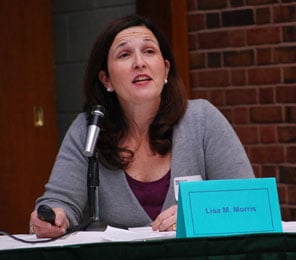 |
|
| Lisa Morris will accept the Language Access Champion award on behalf of MassAHEC for its Medical Interpreter Training program. | |
Among its many initiatives to help ensure a culturally competent, skilled health care workforce for the commonwealth’s diverse population—which includes many immigrants and refugees with limited understanding of English—the Massachusetts Area Health Education Centers (MassAHEC) Network has built a robust Medical Interpreter Training (MIT) program. On May 31, Lisa Morris, MS, will accept the Language Access Champion Award from the National Council on Interpreting in Health Care (NCIHC) on behalf of MassAHEC and the MIT at the Annual Membership Meeting in Madison, Wis.
NCIHC is a multidisciplinary organization with a mission to promote and enhance language access in health care in the United States. Its Language Access Champion awards honor individuals, programs and organizations whose work has contributed to improving the lives of all people through the promotion of language access in health care. Morris, who has been a medical interpreter since 1985 and is the director of cross cultural initiatives for the MassAHEC Network, has been instrumental in establishing and promulgating professional medical interpreter training, testing and certification nationally as well as locally.
Because accurate communication is a vital component in the delivery and receipt of effective health care, the use of trained medical interpreters can help improve access to health care and the quality of that care, reduce costs and ultimately improve patient outcomes. Since 1999, MassAHEC has trained more than 3,000 medical interpreters. Bilingual/multilingual in English and, collectively, more than 30 other languages, MIT trainees help bridge potential health care communications gaps with skills that enhance the therapeutic relationship between patient and provider; facilitating communication during health care encounters for meaning and understanding; and incorporating awareness of and respect for cultural perspectives.
Related links on UMassMedNow:
Successful Massachusetts medical interpreter training program goes to Texas